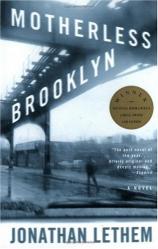Motherless Brooklyn
Review
Motherless Brooklyn
MOTHERLESS BROOKLYN, Jonathan Lethem's latest novel, strikes a near perfect balance between hard-boiled crime story and literary fiction. In rejecting the terse and inscrutable gumshoe in favor of Lionel Essrog, a Tourettic narrator whose self-analysis is relentless, he transcends the conventions of the detective genre, while retaining much of its circuitous, anticipatory, plot-driven spirit. With Lionel at the helm of this mystery, Lethem cleverly piggybacks the more verbally expressive aspects of Tourette's Syndrome, forcing the readers to decode the linguistic creations of the "free human Freakshow's" mind if they wish to know whodunit. The FINNEGAN'S WAKE of crime fiction, MOTHERLESS BROOKLYN is an inventive, intelligent, hilarious and surprisingly poignant story.
The story begins with the requisite whodunit set-up. On a stakeout gone awry, small-time Mafioso Frank Minna, Essrog's boss at the car-service cum detective agency/dysfunctional father figure, is stabbed to death by an unknown assailant. Armed with little more than a vendetta and myriad obsessions (incessant ticking and tapping, counting, and screaming "Eat me Bailey!" among them), Essrog makes it his personal mission to hunt down the killer by infiltrating Brooklyn's "secret system." Of his hero Lethem says, "Right at Lionel's core is the delusion that he's a Chandleresque private detective."
Yet, Lethem is far too dedicated a wordsmith to allow his narrative to play out as a conventional murder mystery, far too gifted to let language take a back seat to crime solving. In Essrog, Lethem has fashioned a medium through which the inherently deceptive, duplicitous and associative nature of language, lurking below normal human consciousness, is finally thrust to the surface and made recognizable. Lionel Essrog ("Liable Guesscog, Final Escrow, Ironic Pissclam") is a living pun, a human spoonerism, and through him, Lethem makes plain the copious linguistic connections between self and world available to the abnormal mind. Watching Essrog unfurl the "wheels within wheels" that are endlessly spinning in his synaptically flawed brain makes for a unique and fascinating reading experience."
In this diminished form the words rush out of the cornucopia of my brain to course over the surface of the world, tickling reality like fingers on piano keys. Caressing, nudging. They're an invisible army on a peacekeeping mission, a peaceable horde. They mean no harm. They placate, interpret, massage. Everywhere they're smoothing down imperfections, putting hairs in place, putting ducks in a row, replacing divots."
However, Lethem does not simply hold Essrog up as an example of linguistic possibilities; he refuses to reduce him to a bundle of idiosyncrasies. With all his peculiarities, Essrog is an extraordinarily human, deeply felt character. Cliché, yes, but you really can't help but feel his pain when Minna, the one person with whom he shared a genuine closeness, passes away. When, in the company of an attractive woman, he is overcome with the urge sniff out the difference between individual Oreos, you appreciate his self-awareness and laugh along as he describes the situation: "I nibbled another cookie and began to despair. I would have been happy now for an ordinary interruptive tic, something to throw my bloodhoundlike obsessions off the scent. The Minna Men were in shambles, yes, but I'd get to the bottom of the Oreo conundrum."
In truth, Lethem's plot line is one rung below nail-biting. Firstly, Lionel's routine Tourettic digressions, while brilliantly scripted, certainly slow the pace of the unraveling mystery (read: if you are an impatient, whodunit traditionalist --- favoring an impenetrable trench coat with bloodhound instincts --- MOTHERLESS BROOKLYN may infuriate you). Secondly, Lethem relies on some pretty old crime noir standbys to paint his picture, like the hyper-Italianized, silent but nodding mob bosses who probably eat a lot of chicken parmigiana and love their mothers fiercely.
Like some sort of Mendelian hybrid, Lethem's MOTHERLESS BROOKLYN is a cross between a classic detective story, a satire of that same story, and a literary exegesis on the infinite complexities of language. Gimmicky? Perhaps. But it is through these gimmicks, most notably Lionel Essrog, that Lethem's insight into the "making and tracing of unexpected connections" is passed. Of all the cool, hip, postmodern novels that have been flooding the market lately, MOTHERLESS BROOKLYN, with its Tourettic, Prince (as in the Artist Formerly Known As) obsessed, gumshoe hero, is certainly one of the best.
Reviewed by Sarah Brennan on October 24, 2000
Motherless Brooklyn
- Publication Date: October 24, 2000
- Genres: Fiction, Literary Fiction
- Paperback: 311 pages
- Publisher: Vintage
- ISBN-10: 0375724834
- ISBN-13: 9780375724831










